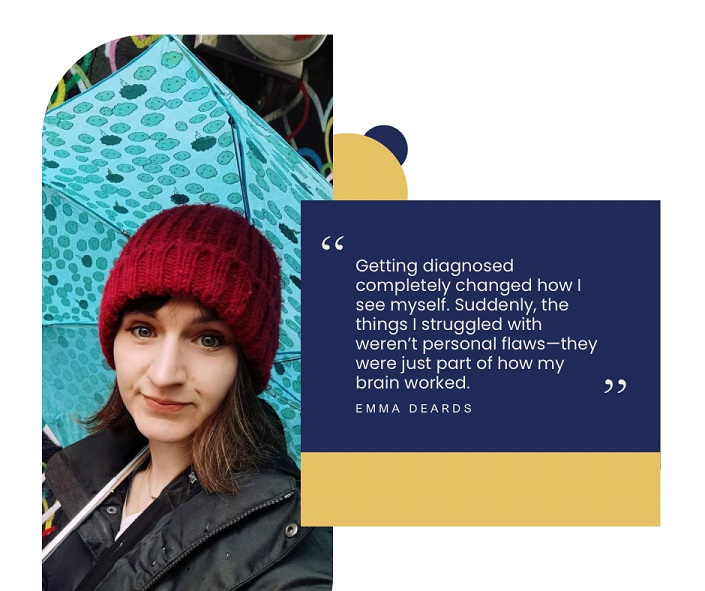Neurodiversity Celebration Week 2025

We’re proud to be supporting Neurodiversity Celebration Week 2025!
Neurodiversity Celebration Week aims to transform how neurodiversity is perceived by providing the opportunity to recognise the many skills and talents of neurodivergent individuals, challenge misconceptions and break down barriers. Together, let’s create a more inclusive world that understands and champions neurodiversity in all its forms.
Emma Deards is a Resident in Small Animal Surgery at the SATH. We’re sharing Emma’s story - her journey with autism, the challenges she faces, and the strategies that help her thrive.

How and when did you get diagnosed, and how did it make you feel?
I was diagnosed as an adult, in my early 30s. I sought a professional diagnosis after multiple significant misunderstandings with friends left me feeling like a complete misfit. Losing another person I cared about for a reason I genuinely couldn’t understand was heartbreaking. It was the final straw after a lifetime of feeling like I wasn’t quite right - like there was some invisible rulebook everyone else had and I didn’t.
When I got the diagnosis, I felt relieved and validated. Suddenly, everything made sense. It gave me a structured way of understanding why certain things were hard for me - why I might feel completely drained after a few hours in a bright, noisy room, for example. It helped me recognize that I wasn’t necessarily sad in those moments; I had just run out of human juice. The diagnosis helped me reframe my experiences in a way that made them feel less like personal failings and more like differences I could work with rather than fight against.
What do you find most challenging at work with your neurodivergent traits?
Communication is the hardest part. I often struggle to understand what people actually want, and I have to ‘mask’ a lot of my natural behaviors to seem more likeable or socially acceptable. That’s exhausting. It takes a significant emotional toll, and by the time I get home, I feel completely drained. I’m also sensitive to everything - lights, noises, other people’s moods, the way things are said to me. I feel things deeply and I have a limited amount of social energy. I think I sometimes come across as too emotional or like I lack control over my emotions, but I suspect that’s more about burnout than anything else. It’s just what happens when I’ve used up all my energy trying to ‘act normal.’
On top of that, I deal with depression, self-doubt, and anxiety, which are all incredibly fun :-|. But at the same time, I also think autism has given me gifts. I’m doing a job in my special interest (surgery), which is a privilege. I have a strong attention to detail, a unique way of thinking and a deep sense of organization and efficiency. I also care a lot about people - I try to be conscientious and considerate. And, from time to time, I’ve been told I’m a funny little shrub.
What has helped you?
A few things have made a huge difference:
- Being aware of my triggers - recognizing when I’m getting overstimulated and taking time to step away, get some fresh air, or just sit in a quiet space.
- Schedule adjustments - having time off after a long shift pattern helps me avoid complete burnout.
- Understanding from colleagues - knowing that some days I’ve just run out of people energy and might be struggling with my mood.
- Reassurance - being told that I’m doing okay, that I’m understood, and that I am not a complete waste of space makes a bigger impact than people realize.
What would you say to someone going through the diagnosis process?
Getting diagnosed completely changed how I see myself. Suddenly, the things I struggled with weren’t personal flaws—they were just part of how my brain worked. I wasn’t too emotional, I was overstimulated. I wasn’t a bad communicator, I just process and express things differently. The diagnosis let me be kinder to myself. I still deal with ignorance and misunderstanding sometimes, but it’s fine—I understand myself better now, and that’s what really matters.
If someone is questioning whether they might be autistic, I’d encourage them to read up on it and see if anything resonates. A formal diagnosis was empowering for me, but it might not be for everyone. Self-knowledge and understanding are never bad things.
I do sometimes wonder how my life would have been different if I had been diagnosed earlier. Would I have used it as an excuse not to push myself, or would I have been spared years of suffering, loneliness, and bullying because I knew what was going on? I don’t know. Autism has given me many challenges, but also many gifts. And I wouldn’t be the person I am without it.